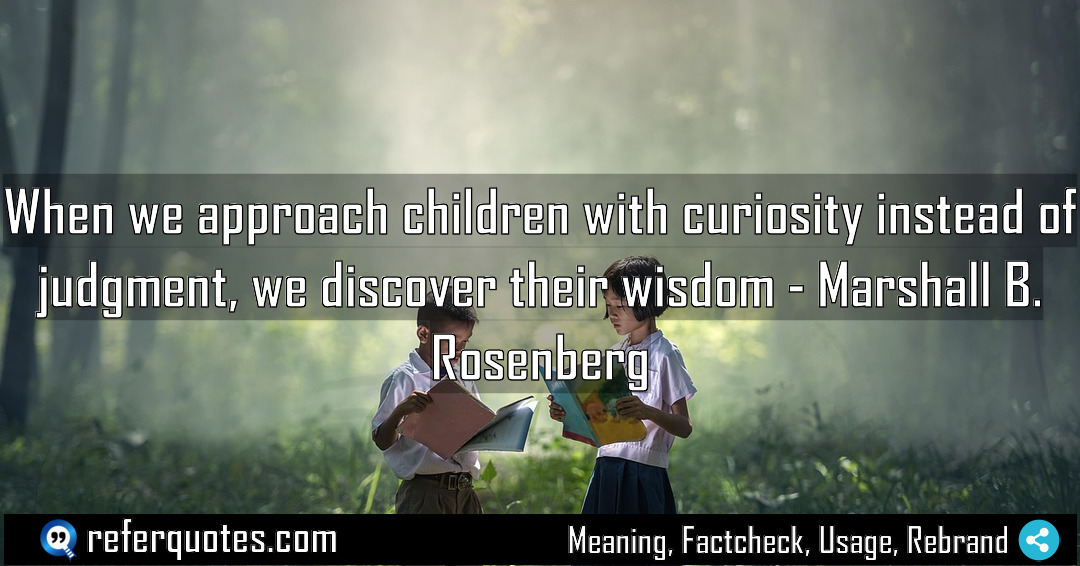
When we approach children with curiosity instead of judgment, we shift the entire dynamic. It’s about seeing their behavior not as a problem to be solved, but as a message to be understood. This simple change unlocks a world of connection and reveals the incredible logic behind their actions.
Share Image Quote:
Table of Contents
Meaning
At its heart, this quote is a call to swap our default “fix-it” mode for a “discover-it” mode. It’s the radical idea that children aren’t just empty vessels we need to fill with our superior adult wisdom, but that they possess their own unique and valid perspective.
Explanation
Let me tell you, this has been a game-changer in my work. We’re so conditioned to see a child acting out and immediately jump to “What’s wrong with you?” That’s the judgment. It puts you on opposite sides of a battlefield.
Curiosity, though? Curiosity asks, “I wonder what’s going on for you right now?” It moves you from being an adversary to being a detective. And when you start digging with genuine curiosity, you find the wisdom. You realize the tantrum isn’t about the cookie, it’s about a desperate need for autonomy. The refusal to do homework isn’t laziness, it’s a fear of failure they don’t have the words for.
Their actions are a language. We just have to be willing to listen.
Quote Summary
Reading Level66
Aesthetic Score89
Origin & Factcheck
This comes straight from Marshall B. Rosenberg’s 2005 book, Raising Children Compassionately. It’s a core tenet of his Nonviolent Communication (NVC) framework. You sometimes see the sentiment echoed in mindfulness or positive parenting circles, but the specific phrasing and the deep structure behind it is pure Rosenberg.
Attribution Summary
Where is this quotation located?
| Quotation | When we approach children with curiosity instead of judgment, we discover their wisdom |
| Book Details | Publication Year/Date: 2004; ISBN/Unique Identifier: 9781892005140; Last edition: PuddleDancer Press, 1st Edition, 48 pages. |
| Where is it? | Chapter: Learning Through Curiosity, Approximate page from 2004 edition |
Context
In the book, Rosenberg isn’t just giving parenting tips. He’s laying out a whole new operating system for human interaction. He frames most conflicts, especially with kids, as a tragic expression of an unmet need. Our judgmental reactions are just our own clumsy attempts to get our needs met. Shifting to curiosity is the practical tool that interrupts this cycle and allows everyone’s needs to surface.
Usage Examples
So how does this look in the wild? Let’s get practical.
For Parents & Educators: Instead of “Stop hitting your brother!” you try, “Wow, you must be really, really upset to hit him. Can you tell me what’s going on?” You’re addressing the same behavior, but the doorway you use to enter the conversation is completely different.
For Leaders & Managers: This isn’t just for kids. A team member misses a deadline. Judgment says, “They’re unreliable.” Curiosity says, “I’m curious about the challenges that came up with this project. What support did you need that you didn’t have?” You’ll discover systemic issues you never knew existed.
For Anyone in a Relationship: Your partner is snippy. Judgment takes it personally. Curiosity wonders, “They seem really stressed. I wonder what’s weighing on them today?” It transforms conflict into connection.
To whom it appeals?
Share This Quote Image & Motivate
Motivation Score84
Popularity Score88
Shareability Score89
FAQ
Question: But isn’t this just permissive parenting? Don’t kids need boundaries?
Answer: Absolutely they need boundaries! This isn’t about letting kids do whatever they want. It’s about how you enforce the boundary. You can hold the limit with curiosity. “I won’t let you hit. I can see you’re furious. Let’s find another way for you to show me that.” The boundary is firm, but the approach is connecting.
Question: How do you stay curious when you’re completely triggered and frustrated?
Answer: You don’t, not always. And that’s okay. The goal isn’t perfection. The first step is just to notice you’re in judgment mode. Sometimes, the most compassionate thing you can do is say, “I’m too angry to talk kindly right now. I need a five-minute break, and then we’ll figure this out.” That self-awareness is a win.
Question: What if the “wisdom” I discover is that my kid is just trying to manipulate me?
Answer: I’d challenge that framing. “Manipulation” is a judgmental label for a strategy to get a need met. Get curious about the need. Is it a need for attention? For power? For fun? When you address the root need, the “manipulative” strategy becomes obsolete.
Similar Quotes
You know, when Brene Brown said “Children learn who they are by watching how we treat ourselves,” she really nailed something profound. It’s not just about the direct lessons we…
Children learn who they are by how we respond. This simple idea from Marshall Rosenberg completely reframes parenting. It’s not about rewards or punishments, but about how we mirror their…
When we replace fear with trust, children open their hearts… it’s a game-changer. This isn’t just theory; it’s the key to unlocking a child’s natural desire to learn and connect…
You know, when Marshall Rosenberg said “Children do not need to be made to learn,” he was onto something huge. It’s about trusting that a child’s natural curiosity is the…
Children learn courage by watching us… and that’s the whole secret right there. It’s not about being perfect, it’s about how you handle the mess. Your kids are watching your…
